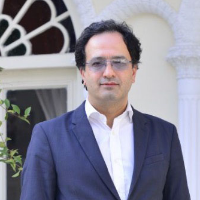The Quest for Identity: the Role of “Self” and “Other” in Russia’s Foreign Policy
According to most international relations scholars, the role of geopolitical rivalries and political-security issues at the regional and global political levels, as well as Russia’s domestic policy issues in recent years, have been key elements in Russia’s relations with the United States in the last decades. While accepting the dominant views, this article points to another influential element in shaping the relationship between Russia and the United States, especially in the last decade. In this regard, the authors try to expand the existing literature in this field as much as possible. Thus, the author’s concern is expressed in this question; what role does the United States play in the position of the “other”, the formation of national identity, and the conduct of Russia’s aggressive foreign policy in the transitional international system. According to this question, this article’s main argument is that; Russia has been redefining its position as a “great power” in the transitional international system to confront the United States as its specific “other”. This seems to be rooted in Russia’s aggressive foreign policy approach, especially under Putin’s leadership. According to this article, the United States, as a historical “other”, misinterpreted Russia’s interests and historical role as a key player in the international system, with a misunderstanding of the collapse of the Soviet Union while recognizing that Russia’s great power status has an important role for its national identity. Russia’s perception of itself is the image of great power. This vision includes Russia’s willingness to participate in the decision-making process on global issues and to have a sphere of influence. Since the mid-1990s, Russia has gradually regained its lost confidence and power and has emerged as a claimant state in the international system. From the time Vladimir Putin came into office, Russia has been seeking to regain its status as a great power in the international multipolar system by adopting more pragmatic policies. Russia’s foreign policy approach under Putin has sparked serious debates about the reasons for Russia’s aggressive actions during this period. Most Western scholars and politicians often find Russia’s post-Cold War behavior unpredictable, irrational, anti-western, aggressive, and expansionist. Examples of such behaviors include Moscow’s rapid response to NATO’s intervention in the 1999 Kosovo crisis, the invasion of South Ossetia in Georgia in 2008, the annexation of Crimea, and finally Russia’s military intervention in the Syrian civil war in 2015. Some IR scholars began to argue that the key external factors, geopolitical rivalry, and Russia’s political-security conflict with the west are playing a critical role in shaping Russia’s foreign policy behavior. In contrast, some observers emphasize domestic factors as the main reason behind the Kremlin’s policies in recent years, such as state stability, fear of color revolutions, and attempt to divert people’s attention away from domestic problems. Although all the abovementioned factors play a critical role in Russia’s strategic assessments, these factors have not considered psychological, social and emotional motivations. Those mainstream analysts who rely on positivism in approaching Russian foreign policy have not considered other factors such as positive social identity, national self-esteem, and concerns about its status in the international system. The main goal of Russia’s foreign policy, especially under Putin’s presidency, is to achieve the position of great power in a multipolar system in which Russia is considered as one of the main poles. Over the years, the content of Russia’s foreign policy has not changed fundamentally, but influential domestic and international variables such as rising global oil and gas prices, which are Russia’s main exports and declining US commitments, especially in the Middle East, have been changed. These factors have given Kremlin more leeway in choosing its political options. Based on the above considerations, this article seeks to find an appropriate answer to the question of what role does the United States plays in the position of the “other” information of Russia’s national identity and aggressive foreign policy behavior in the transitional international system. The main hypothesis of this article is that Russia’s aggressive policies such as military intervention in Syria and the annexation of Crimea, show the revival of traditional values as key elements of the country’s foreign policy strategy. According to the authors, Russia, especially after the ascension of Putin to power, has been seeking to counter certain “other” actions, namely the United States, by redefining its great power status. This hypothesis seems to provide a much better understanding of Russia’s aggressive behavior in the international system, such as its dealings with the crises like Georgia, Ukraine, and Syria.
- حق عضویت دریافتی صرف حمایت از نشریات عضو و نگهداری، تکمیل و توسعه مگیران میشود.
- پرداخت حق اشتراک و دانلود مقالات اجازه بازنشر آن در سایر رسانههای چاپی و دیجیتال را به کاربر نمیدهد.




